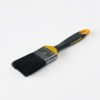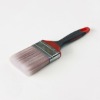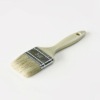1)Item No. B1-161326 2)Pure white bristle flat paint brush 3)Tin ferrule 4)Adjustable angle plastic handle 5)Shrink packing
Softer white China bristles provide a smoother finish Naturally tapered and flagged for excellent flow and leveling The best choice when an extremely smooth finish is desired
Material | White China bristle | |||
Style | Flat Sash Brush | |||
Ferrule | Tin-plated ferrule | |||
Handle | Adjustable angle plastic handle | |||
Item Number | Size | Thickness(mm) | Length Out(mm) | |
B1-161326-63 | 2.5” | 20 | 51 | |
B1-161326-76 | 3” | 20 | 57 | |
About Applicators:
The most important part of a paint brush is the working end. Performance is based on the engineering of the filament, which you can’t see but can definitely experience.
The filament and how it is finished or tipped affects the feel of the brush and the results you get. Every company guards their proprietary tipping methods, because they’re a big part of what makes each brand different.
Finishing is an ever-changing technology that top manufacturers strive to master in order to provide the best performance in today’s coatings.
Tapered filament helps paint flow for better coverage. It “pumps the paint” out and down to the surface. It also gives shape to the brush for precise cutting-in. Look at the brush edge-wise. If it comes to a point, it also taper and will provide more control.
Untapered or level filament reduces the price of the brush, but it also sacrifices capacity, coverage, and control. It won’t release paint like tapered filament. If the thickness of a brush feels the same from base to tip, it is untapered. It lacks the performance of a brush with tapered filaments.
Natural bristle is the best choice for oil-based paints, varnishes, shellac, alkyd enamels, oil stains, and oil-based polyurethanes.
The highest quality comes from mainland China. It has the softest natural tipping and flexibility. Provide the smoothest finish with virtually no brush marks.
Bristle is not recommended for latex or acrylic paints because it will absorb up to 40 percent of its own weight in water, causing it to flare or become too soft to paint effectively. Also, rough surfaces will break the tips off natural bristle so it will no longer provide that smooth, glass-like finish.
Nylon is five times more durable than bristle, so it’s best to choose a synthetic brush for paint rough surfaces—even when using oil-based paints.
oil/paint/varnish brush












